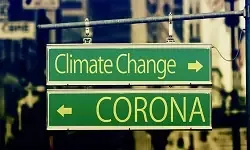What is climate change?
Climate change is causing global warming. And scientists have
warned that urgent action is needed to protect. the planet from the effects of
climate change.
We also need to know what climate change is and how it is
affecting our environment.
Human activity has increased carbon dioxide emissions, which
in turn raises the temperature.
Severe weather conditions and possible melting of polar ice
caps are among the possible effects.
What is climate change?
The climate of an area is the average of its seasons for many
years. Climate change is a change in this average.
Earth is now undergoing rapid climate change and global
temperatures are rising.
What does climate change mean?
Climate change will change our lifestyles. Making water
scarcity and food production difficult.
Some areas can become dangerously hot and others may become
uninhabitable due to rising sea levels.
Severe weather events such as heat waves. rains and storms will
recur and increase in intensity, endangering people's lives and livelihoods.
Citizens of poorer countries are less likely to adapt. So
they will suffer the most.
Environment
Polar ice and glaciers are melting fast. There is a risk of
flooding in the low-lying coastal areas as well as in the oceans.
When frozen ground melts in places like Siberia, methane, a
greenhouse gas, is released into the atmosphere, increasing the effects of
climate change.
Favorable weather conditions are on the rise for forest fires.
The nature
When their territory changes, some breeds of animals will
move to new areas.
But climate change is happening so fast that many species are
threatened with extinction.
The polar bear is in danger of disappearing as the ice on
which it relies is melting rapidly.
Salmon fish populations in the Atlantic Ocean could be
destroyed as the rivers in which they breed are warming up.
Increased acidity in the oceans due to the absorption of more
carbon dioxide can lead to the disappearance of coral reefs.
What are the reasons?
The climate has always been subject to natural changes.
But due to human activities, global temperature is now
rising.
The world has warmed by about 1.2 degrees Celsius since
people started using oil, gas and coal in the past. The fuel is being used to
power plants, transport and heat homes.
Burning these fossil fuels emits greenhouse gases that trap
solar energy.
The amount of greenhouse gas carbon dioxide in the atmosphere
has increased by almost 50% since the 19th century and by 12% in the last two
decades.
Deforestation is another reason for the increase in
greenhouse gases.
When trees are burned or cut down, they usually store and emit carbon.
What will happen in the future?
Scientists have set a 1.5 degree Celsius rise in temperature
as the "safe" limit for global warming.
armful changes in the natural environment can change a
person's lifestyle if the temperature rises.
Many scientists believe that this will happen and predict an
increase of 3 degrees Celsius or more by the end of the century.
It will have different effects all over the world.
Heavy rains in the UK could cause flooding.
Countries in the lowlands of the Pacific Ocean could be
submerged due to rising sea levels.
Many African countries will suffer from drought and food
shortages.
Severe drought in North America will affect the western part
of the country, while additional rainfall and more severe storms are expected
in other areas.
Extreme heat and severe drought are expected in Australia.
What are governments doing?
Countries around the world are being asked to set goals that
will reduce their greenhouse gas emissions to zero by the middle of this
century.
This means that any emissions will be balanced by absorbing
equal amounts, for example by planting trees.
It is hoped that this will prevent the most dangerous effects
of climate change by stopping the rapid rise in temperature.
What are scientists doing?
Scientists are becoming increasingly aware of climate change.
For example, they can now detect the relationship between
climate change and a single climatic event, such as heavy rain and heat waves.
Hopefully, they will be able to better predict such weather
disasters in the future.






.jpg)
0 Comments